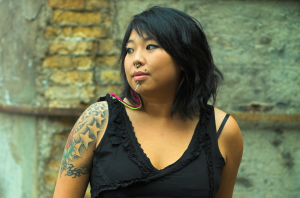Originally published on Milk Junkies and republished here with the author’s permission.

Source: Unsplash
Questions Not to Ask a Pregnant Transgender Person*
* Or any pregnant person whose gender identity you are not absolutely 100% certain about – so, really, any pregnant person.
I came out as a transgender guy and transitioned by changing my legal name, taking testosterone, and having top surgery.
Friends and colleagues were generally awesome with that, as well as highly supportive. Virtually everyone I knew used “he/his” pronouns for me as I asked them to, and many made special efforts to help me feel included.
At work, people came up to me one by one and shook my hand or gave me a hug. I received congratulatory e-mails and even accepted an invitation to a celebratory dinner at a colleague’s home in honor of my coming out.
I felt affirmed and empowered by my community. I became more confident and comfortable with myself than I ever had been before, and I started dating someone seriously for the first time in my life. Our relationship blossomed quickly, and we soon married, surrounded by friends and family.
A few years later, I stopped taking testosterone and became pregnant.
And my allies’ world was turned upside down.
Even though I wasn’t showing yet, simply knowing that I was pregnant caused some people to start using “she/her” pronouns for me. One woman told me, “If you give birth, then you’re a mother.”
My gender identity came into question because of my decision to carry a baby, as if I wasn’t a real transgender guy anymore.
The truth is: A few friends have told me about their transgender or genderqueer identity during or after their pregnancies. This shows that friends, family, and healthcare providers interacting with a pregnant person might be unaware of that person’s gender identity. Similarly, other friends have told me that although they do understand themselves to be cisgender women, they still don’t appreciate the gendered assumptions that our culture attaches to pregnancy and motherhood.
Perhaps they’ve opened up to me because they know I’ll get it.
These are real questions that real people asked me. They may even be questions that you, unbeknownst to their hurtfulness, have asked or wondered about. So let me explain why they’re damaging.
1. Have You Had Surgery ‘Down There?’
Trans people get this question all the time – in everyday life and also, famously, during prime-time television interviews.
It’s always inappropriate to focus on a transgender person’s genitals instead of seeing the whole person, but perhaps especially so when the trans person is pregnant.
During any pregnancy, there is a tendency for others to focus on the belly and fetus, not the parent-to-be. Couple this with the common obsession over a transgender person’s history of surgery, and the emotionally intelligent human carrying the baby might feel forgotten altogether.
I was once asked a variation on the “down there” surgery question when I was attending a midwifery conference as an invited speaker. I was very pregnant at the time, and obviously going to have a baby.
A midwife approached me, apologizing for not having attended my session, and then she said, “I’m just so curious about one thing: Do you have a penis?”
I said I’d never had that type of surgery. We chatted awkwardly for another minute, and then I ducked out for the rest of the evening, no longer having the stamina for anything more.
I think this question comes from the assumption that all transgender people want to transition “all the way,” which is why it’s such a common one all around. Transition for a female-to-male individual must involve hysterectomy and genital surgery, right? Wrong! The truth is that we transition in a variety of ways, to whatever degree makes us comfortable or that we can afford. And for many trans people, transition isn’t linear.
The question also may come from a place of interest or fascination. If someone hasn’t considered transgender identities and health in the past, they may simply be curious about how it all works. To some extent, that makes sense.
But it’s painful to be treated like a curiosity or a source of scandal or entertainment. You really don’t need to know whether your pregnant trans friend has had or desires any kind of bottom surgery, such as hysterectomy, clitoral release, urethral lengthening, or phalloplasty.
A hysterectomy would preclude carrying a baby, so if you know someone is pregnant, it makes no sense to ask if they’ve had that procedure. Phalloplasty often involves the use of some material from the vulva, and urethral lengthening is problematic without also having a hysterectomy. In other words, it might be possible for someone to have a phalloplasty procedure without hysterectomy and to subsequently carry a baby, although it seems medically improbable and I don’t know if anyone has ever done it.
One thing I’m sure of is this: If your pregnant trans friend has had bottom surgery, they likely don’t want to be interrogated about it while trying to cope with morning sickness. If you’re really interested, you can read about those procedures by Googling to your heart’s content.
The day after my encounter with the midwife, she came to find me, and she apologized deeply. She had realized on her own that her question was intrusive and unnecessary. In fact, no one should be asking anyone about their genitals, transgender or not, pregnant or not.
Would you ever ask a cisgender colleague in a professional setting about the size of his penis? Would you ask a pregnant woman if she plans to have an episiotomy? I hope not!
If you want to show that you’re interested in your pregnant trans friend’s well-being, you could ask, “How are you doing?” or “Are you getting good access to healthcare?” If you’re a healthcare provider caring for a pregnant trans person, you could simply ask, “Do you have a history of any surgeries we should know about?”
2. ‘Are You Going to Keep the Baby?’
A colleague asked me this question after I had announced my pregnancy at work. I was married – and more than twelve weeks pregnant.
To be honest, I think his real question was whether or not the pregnancy was planned. Just like the rest of the population, some transgender people who become pregnant didn’t intend to have babies, but that’s not the case for all of us.
The unpleasant implication behind the question is that a transgender person wouldn’t want to have (or shouldn’t have) a baby.
One might assume that pregnancy would cause terrible gender dysphoria for a trans guy, but that’s individual – and it’s not been my experience. Even so, gender dysphoria might be a reasonable price to pay for some trans guys who want kids.
Again, this is a question no one should ask of anyone – not of a teenager, not of a low-income individual, as it is frequently rudely asked. And not of a trans person. The question itself is immediately judgmental, whether it’s about marital status, income, age, race, or gender identity.
3. ‘How Do You Know This Is Safe?’
A lot of people assumed that because I had a beard and a low voice, I was still taking testosterone despite being pregnant.
As such, a man at my workplace asked me, “But how do you know this is safe?” as if I’d never considered the issue before.
To me, the question suggested that I was ignorant, didn’t care about my baby, or both. Even some healthcare providers asked repeatedly if I was taking testosterone, seemingly not trusting my answer.
Before trying to get pregnant, I talked to my endocrinologist (that’s a hormone doctor) and family doctor about any risks they could foresee. My endocrinologist advised me to stop taking testosterone and wait until my menstrual cycles became regular. He said that, in the form I was taking it, testosterone leaves the tissues quite quickly, typically within about ten days. He told me that my eggs shouldn’t be affected by my previous testosterone use. My family doctor just shrugged and reminded me to take folic acid!
If you have a transgender friend or acquaintance who is pregnant, you don’t need to ask about this. If you’re a healthcare provider, knowing whether or not your patient is still taking testosterone is important. You also need to realize that, for some of us at least, a beard doesn’t disappear when testosterone use is halted.
Any conversation about the safety of a pregnancy is best left between a patient and their healthcare provider. They can consider all the available information together and make informed decisions.
If you’re personally concerned, the best you can do is ask how you can be helpful.
4. ‘Did You Enjoy the Process of Making Your Baby?’
A colleague once asked me this – and then quickly added, “Because I haven’t always enjoyed that myself, you know, so I was wondering what it was like for you.”
She was curious, and also trying to relate to my experience. But to me, it was just another way of asking a transgender person how they have sex. And that’s weird and awkward.
For folks who don’t have simple access to sperm in their relationship, conceiving a baby might be separate from making love anyway.
How does anyone make love? Doesn’t any sexually active person need to take time to figure out what works for them and their partner(s)? And is that really something you would ask a casual acquaintance on a coffee break at work?
If you wouldn’t ask it of a cisgender person you barely know, why does it seem okay to ask someone who is transgender?
5. ‘But What About Breastfeeding?’
When I was pregnant for the first time, a friend asked me about breastfeeding, as if I should reconsider my pregnancy since he assumed I couldn’t. I said that I didn’t know, but that my partner had been adopted and formula-fed, and we were sure we’d figure out how to feed the baby.
My friend extolled about the importance of breastfeeding at length, and then asked again, “But what about breastfeeding? How’s that going to work?” The questions put immense pressure on me.
It turns out that I’m able to make a small amount of milk despite having had chest surgery. But I’m a man and I have a chest, not breasts, so I (and many other transgender men) tend to prefer terms like “nursing” and “chestfeeding” instead of “breastfeeding.”
I deeply value my nursing relationship with my child. However, lots of people, transgender or not, choose not to nurse, and that’s their choice – and it’s a valid one.
I think nursing is awesome, and I’ve been chestfeeding my kids for five years straight – but having a baby doesn’t hinge on it. I don’t think we should ask cisgender women if they’re going to nurse either.
For instance, there’s no easy way for a friend or healthcare provider to know if a woman has a history of sexual abuse that may make it emotionally impossible for her to nurse.
Asking someone if they’re going to breast- or chestfeed assumes that the correct answer is yes – and if it’s no, an explanation should be offered. We can help improve nursing rates by providing fantastic support to those who do want to nurse instead of adding pressure.
And let’s not forget that people who don’t breast- or chestfeed need our support, too – because taking care of a newborn is always challenging, regardless of how you’re feeding them.
For friends and healthcare providers alike, a more open-ended question would be better, such as “How do you plan to feed your baby?”
If you’re lactating and interested in helping, you could ask if your transgender friend might wish to accept donated milk.
6. ‘Do You Know the Baby’s Gender?’
During my pregnancies, friends and strangers alike asked me this obsessively. I always thought to myself, “Do you know who you’re asking?” Identifying a baby as male or female based on its genitalia has to do with its sex, not its gender.
I never cared during my pregnancies about what my babies’ genitals might look like. I wondered if they would be happy, sleepy, curious, affectionate, serious, light-hearted, optimistic, or any number of other characteristics before I thought about whether they had a penis, a vulva, or some combination.
A few people who asked about my baby’s sex explained that they wanted to know what color clothing to save and pass on to our family, or what type of card to buy in order to congratulate us when the baby arrived.
I certainly can’t speak for all transgender people, but personally, I’ll say that my own experience of gender fluidity has informed how I feel as a parent when it comes to clothing choices. I’m a firm believer that all colors belong to all genders. I’ve dressed my kids in diverse styles and colors.
As my first child got older, he started to choose how he wanted to express himself through clothing. I will never tell him that pink is only for girls. Hearing people fretting about what colors to give my baby because they didn’t yet know her sex brought back painful memories about what I was and wasn’t supposed to wear as a child.
If you’re not sure how your pregnant friend might want to dress their infant or you don’t know what they need, try to ask in a way that is free of assumptions. “What kinds of clothes do you need for your baby?” and “What colors would you prefer for your baby?” are both respectful questions. And they’re likely to provide much more informative responses than the roundabout question on “gender.”
***
Be careful about the assumptions contained in your questions, no matter who you’re talking to. The person you think of as your pregnant “lady” friend or that “mom-to-be” just might tell you that she/he/they would prefer more neutral language choices.
And if you’re trying to be a supportive friend, noting what questions not to ask is a good start.
Want to connect with your transgender friend who’s pregnant? Try asking whether your friend has felt their baby move yet or heard the heartbeat. Both are indescribably beautiful and intimate ways to connect with the being growing inside their belly.
[do_widget id=’text-101′]
Trevor MacDonald is a transgender man from Manitoba who birthed both his children at home and breastfeeds. He is the author of Where’s the Mother: Stories from a Transgender Dad. Trevor initiated and helped to design and analyze a University of Ottawa study focusing on the experiences of transmasculine individuals with pregnancy, birth, and infant feeding. The study was funded by the Canadian Institutes of Health Research – Institute of Gender and Health. Trevor blogs at milkjunkies.net. He runs a support group on Facebook called Birthing and Breast or Chestfeeding Trans People and Allies.
Search our 3000+ articles!
Read our articles about:
Our online racial justice training
Used by hundreds of universities, non-profits, and businesses.
Click to learn more
Most Read Articles
- « Previous
- 1
- …
- 30
- 31
- 32



















